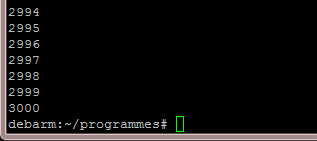J'ai utilisé la fonction gettimeofday() de /sys/time.h qui a une precision supérieure à clock().
On peut définir une fonction à appeler périodiquement. Elle doit être du type : void fonction(void* data)
Cette classe utilise la bibliothèque pthread qui est normalement déjà installé sur la Fox. Il faut juste signaler à Eclipse qu'on l'utilise : Project->Properties->C/C++ General->Path and Symbols->Librairies->Add "pthread"
Timer.h :
/*
* Timer.h
*
* Created on: 12 juin 2011
* Author: Eliott
*/
#ifndef TIMER_H_
#define TIMER_H_
#include <sys/time.h>
#include <iostream>
#include "pthread.h"
class Timer {
public:
Timer(int wait); // wait en ms
void setCall(void(*fonction)(void*),void* arg); // fonction à appeler périodiquement
void start();
void stop();
private :
static void* callRun(void* data);
void run();
int wait;
void(*fonction)(void*);
void* arg;
struct timeval start_t, end_t;
pthread_t thread;
};
#endif /* TIMER_H_ */
Timer.cpp :
#include "Timer.h"
Timer::Timer(int wait) {
this->wait=wait;
thread=0;
}
//****************************************************************************
void Timer::setCall(void(*fonction)(void*),void* arg){
this->fonction = fonction;
this->arg =arg;
}
//****************************************************************************
void Timer::start(){
if(thread==0)
pthread_create(&thread,NULL,callRun,this);
}
//****************************************************************************
void* Timer::callRun(void* data){
Timer *t = reinterpret_cast<Timer*>(data);
t->run();
return NULL;
}
//****************************************************************************
void Timer::stop(){
if(thread!=0){
pthread_cancel(thread);
thread=0;
}
}
//****************************************************************************
void Timer::run(){
double temps;
while(1){
gettimeofday(&start_t, NULL); // Récupération temps début
if(fonction!=NULL) fonction(arg); // appel de la fonction définie par setCall
temps=0;
while(temps<wait){
gettimeofday(&end_t, NULL); // Récupération temps fin
temps = (end_t.tv_usec-start_t.tv_usec+2)/1000;
temps += (end_t.tv_sec-start_t.tv_sec)*1000;
}
}
}
Voici un main d'exemple qui affiche un compteur toute les 10 ms pendant 30 secondes.
On doit donc avoir 3000 affichages à la fin.
main.cpp :
#include "Timer.h"
#include <iostream>
using namespace std;
// afficher le compteur et l'incrementer
void afficher(void *data){
cout<<(*(int*)data)++<<endl;
}
int main(void) {
int compteur = 0;
Timer timer(10);
timer.setCall(afficher,&compteur);
timer.start();
sleep(30);
timer.stop();
return 0;
}


Aucun commentaire:
Enregistrer un commentaire